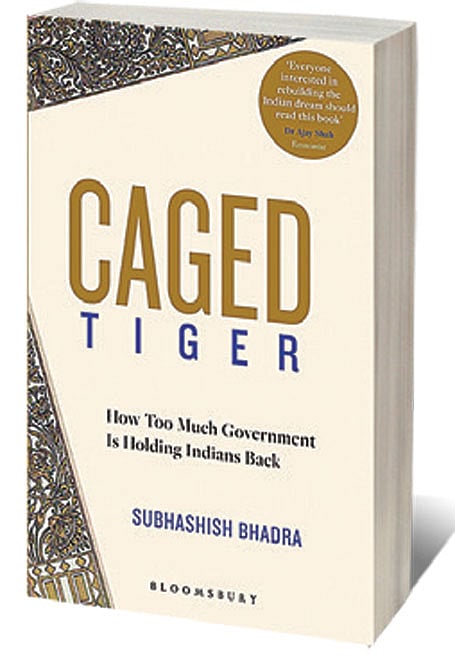The Force Within

OF LATE, THERE has been a virtual tsunami of books, exposing the dark underbelly of Indian polity. To cite a few, Red Tape by Akhil Gupta (2012), A Feast of Vultures, by Josy Joseph (2016), Between Hope and Despair by Rajeev Bhargava (2022), and others of their ilk. Most of these take an eclectic view on a range of topics, from the shenanigans of the private secretaries of ministers, to encounters between low-level officials and welfare recipients, to a hundred ethical reflections on contemporary India, and everything in between.
First-time author, Subhashish Bhadra, in his book, Caged Tiger has taken the road less travelled. He has opted for a narrower focus—some will term it as ‘tunnel-vision’—on institutional mechanisms. This comes with its own set of pluses and minuses. There can be no doubt that the biggest positive is a comprehensive analysis of the set of systems, rules and regulations and procedures that govern us. These have not received their share of rigorous academic attention in the past. The downside is that an element of monotony sets in when one is denied the prism of a many-faceted narrative.
Using the pandemic as a springboard, the author sets the scene in the introduction to examine the importance of the institutional framework in the life of a nation. He makes two important points—one that we are obsessed with individuals to the neglect of our institutions, and that we trust governmental institutions more than what they deserve. He proposes a troika of measures—tightly written laws, transparent adherence and independent oversight—as a means to overcome the institutional deficit that confronts us.
So far, so good. Using the troika as a springboard, Bhadra takes us on an extended tour of the institutional structure across the political and socio-economic spectrum. Along the way he covers critical areas, such as the food security apparatus, digital surveillance of citizens, suppression of free speech, police atrocities, moral policing of cultural preferences, the dysfunctional parliamentary system, and the ever-extending regulatory tentacles of government. The last two chapters delve into a scenario in which the rapidly evolving technologies of today impact institution building, against a backdrop of people’s movements.
Openomics 2026: Continuity and Conviction
06 Feb 2026 - Vol 04 | Issue 57
The performance state at its peak
No one can accuse Bhadra of not doing his homework. Each chapter is meticulously researched, with a wealth of facts, quotes from experts and examples taken from other countries. The average number of references per chapter comes to a staggering 71, while reaching 91 in the chapter on police. Nor can one complain that he is peddling any particular ideology—he views institutional frameworks from a neutral lens, which is a refreshing change in these polarised times.
A number of surprising and interesting facts surface in the course of the book. We learn, for instance, that Section 144 was first imposed in Baroda around 1861 to suppress the freedom movement. And who would have thought that an adult can sustain 150 stable relationships at any point in time? (Estimate by Robin Dunbar, a British anthropologist.)
While the descriptive effort is praiseworthy, the same cannot be said for the prescriptive element. Indeed, corrective steps are dealt with perfunctorily, with the applicability of the magic troika being repeated ad nauseam. Some of the ideas border on the outlandish—the author’s espousal of sortition, for example. This substitutes elections with a random draw from citizens eligible to hold public office. While this may have worked for early democracies with small populations, it would be a pipedream to imagine that it could supplant political parties today.
Given that this is a first-time effort, the author holds considerable promise. He will go far if he supplements his analytical tools with a keen eye for remedial measures. Else his work will be saddled with that hoary epitaph, “The operation was successful but the patient died!”

